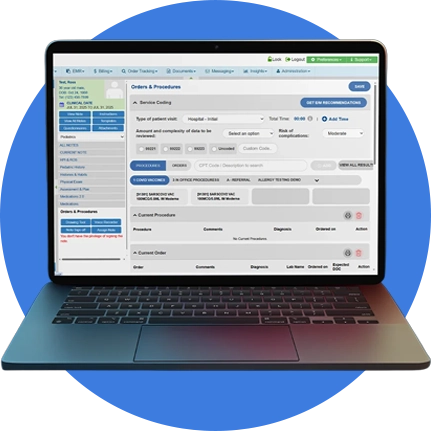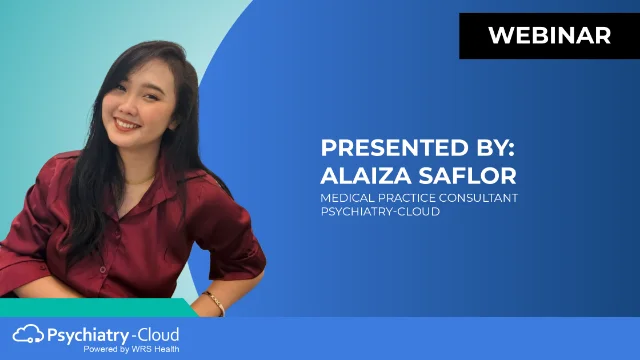Key Takeaways
- AI is already redefining psychiatry practice management—successful implementation depends on choosing tools that integrate seamlessly and deliver measurable results.
- Automation lowers burnout and billing risk, giving clinicians time back to focus on care and accurate documentation.
- Psychiatry-Cloud’s All In Intelligence represents the future of AI in medicine: intelligent workflows designed by physicians to remove the barriers that keep doctors from care.
- Learn more about how All In Intelligence means a smarter psychiatry EHR.
Artificial intelligence has become a defining force in nearly every field—and psychiatry is no exception. From coding and scheduling to patient documentation, AI is already reshaping how behavioral healthcare practices operate.
Yet as adoption increases, confusion can become commonplace. What AI tools actually work for psychiatrists? What high-tech promises are simply marketing hype?
During AI in Medical Practices: What Works and What’s Just Hype, Dr. Michael Dunn, CEO of Gateway Urgent Care and board member of the Arizona Medical Association, joined Adam Finzen, DPM, Director of Business Development at WRS Health, to help providers navigate the fast-changing AI landscape.
Table of Contents
1. The Psychiatry AI Market Is Booming—But Not Everything Delivers Value
As Dr. Dunn noted, this surge in interest has also led to “AI inflation”—an influx of agents promising major change but offering limited integration or measurable impact.
Many products are built for enterprise systems, not smaller or specialty practices. Others require extra logins, high subscription fees, or disrupt existing workflows. The result: technology that’s meant to save time often slows clinicians down.
Put It Into Practice:
2. Private Psychiatry Practices Need AI to Stay Competitive
AI for private psychiatry practices is fast becoming a much-needed tool for survival. Insurers now use AI to pre-screen and downcode claims, shifting leverage away from providers.
Dr. Dunn shared that clinics applying AI to coding support, claim preparation, and pre-encounter documentation experience fewer denials and faster reimbursements. Automating pre-visit workflows and compliance documentation allows clinicians to recover hours weekly while improving accuracy.
Put It Into Practice:
Start where time loss is highest—documentation, coding validation, or eligibility checks. Introducing AI in these areas offers the most immediate improvements in both efficiency and revenue integrity.
3. What’s Actually Working Right Now
Meaningful AI progress in psychiatry comes from focused, task-specific tools—not broad, generic platforms. Dr. Dunn highlighted several applications delivering measurable value today:
- Ambient listening (AI Scribes): Secure, real-time transcription that reduces documentation time.
- Coding Assistants: Recommend accurate codes to improve billing precision.
- AI Search and Summaries: Extract key details from incoming CCDAs or external records.
- Mobile AI Apps: Extend access to telehealth, charts, and secure prescribing.
- Patient Intake Assistants: Simplify registration with guided, pre-visit forms.
Dr. Dunn emphasized that integration and specificity determine success. AI built directly into the EHR creates efficiency; AI that functions separately creates friction.
Put It Into Practice:
Prioritize AI that enhances, not interrupts, existing workflows. The best systems operate quietly in the background—helping clinicians without changing how they work.
4. The Hype to Avoid in AI for Psychiatry
Not every AI innovation adds value. Dr. Dunn warned against:
- Predictive diagnosis agents that promise to “replace” physician reasoning
- Generic tools not tuned for specialty workflows
- Add-on subscriptions that don’t connect with your EHR
- Broad claims of saving time and money with no data to back them up
These tools may sound impressive but rarely align with real-world needs. As Dr. Dunn noted, the goal isn’t to replace psychiatrists—it’s to empower them.
Put It Into Practice:
Ask vendors direct questions: How will this make my workflow faster or more accurate? Can you show proven results from similar practices? If the answers aren’t specific, be skeptical.
5. Intelligent Psychiatry AI Removes Barriers for Providers
When done well, AI’s highest value is often hidden as it works behind the scenes to simplify care. Psychiatry-Cloud is All In Intelligence, building technology that doesn’t live in a dashboard but inside your daily workflow.
From scheduling to billing, documentation to chart prep, intelligent agents streamline operations, reduce clicks, and surface relevant data in real time. These systems are built by physicians for physicians, with one goal: restoring balance to modern medicine.
As Dr. Dunn summarized, “AI should take away friction, not add it.”
Put It Into Practice:
Intentional AI Can Support Real World Care
The lesson from Dr. Dunn’s webinar is clear: the question isn’t whether to use AI—it’s how to use it intentionally.
The evolution of AI in mental healthcare will reward practices that adopt technology thoughtfully—choosing tools that strengthen relationships between clinicians, data, and patients.
With All In Intelligence, Psychiatry-Cloud leads AI agent development that simplifies, connects, and empowers clinicians to focus on what matters most: care.











